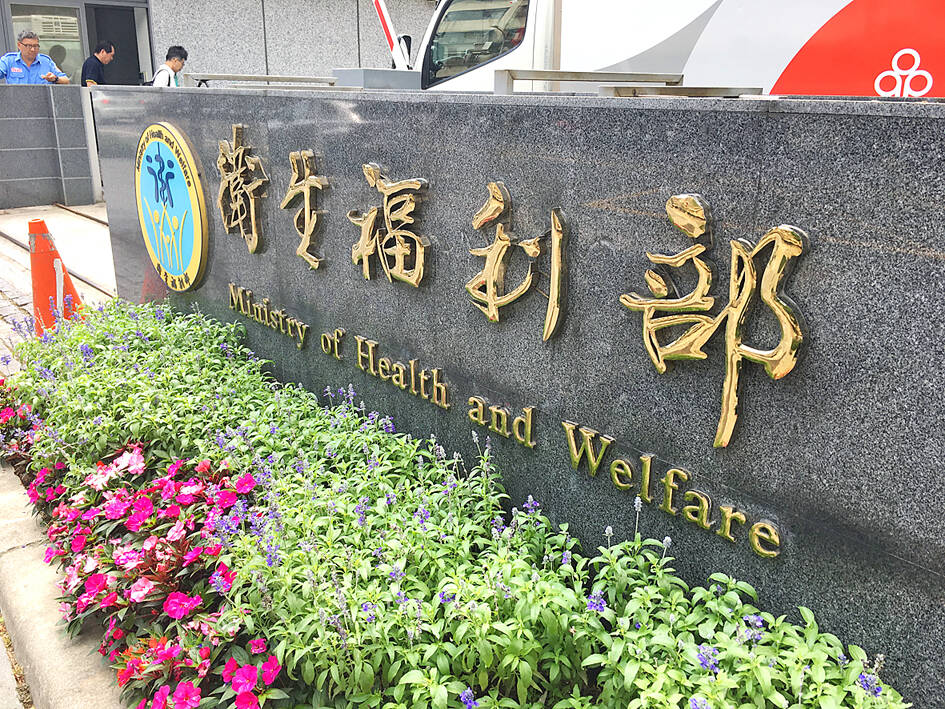The central government plans to subsidize the freezing of eggs for medical reasons, Health Promotion Administration (HPA) Director-General Wu Chao-chun (吳昭軍) said yesterday, adding that the policy might be implemented by the end of the year.
There were about 121,000 people diagnosed with cancer in 2021, with those aged 15 to 49 years old — the childbearing age — making up 16 percent, cancer registry data for that year showed.
Among the 15,448 breast cancer cases, 31.33 percent were of childbearing age, and 2,700 of the 4,800 cases who were of childbearing age, were aged between 20 and 44 years old, the data showed.

Photo: Lin Hui-chin, Taipei Times
Some female patients consider freezing their eggs before undergoing treatments for cancer, catastrophic illnesses or other diseases that might affect their fertility to preserve the possibility of motherhood in the future.
However, egg freezing treatments cost about NT$80,000 to NT$120,000 (US$2,595 and US$3,893), with a yearly storage cost of between NT$5,000 and NT$10,000, so patient support groups have been calling on the government to subsidize medical egg freezing.
The issue has been in discussion since last year and is becoming clearer, Wu said, adding that the HPA is consulting with experts to plan the details and draft healthcare facility guidelines.

Photo courtesy of the New Taipei City Government
Breast cancer patients would be eligible for the program, but the specific cancer types and treatments, as well as the total number of eligible patients and budget are still under discussion, he said.
Hopefully the policy can be implemented by the end of the year, or at least the beginning of next year, Wu added.
Egg freezing subsidies for cancer patients are being offered in Taipei, New Taipei City, Chiayi City and Taoyuan City, while social egg freezing subsidies are available at Taoyuan City, Hsinchu City, Yunlin County and Miaoli County, Wu said, adding that the subsidies range between NT$20,000 and NT$35,000.
Wu said no central government in the world subsidizes social egg freezing, as it might encourage people to get married and have a child at an older age.
Taiwan does not have established guidelines for discussing fertility preservation with cancer patients, Hope Foundation for Cancer Care deputy CEO Brenda Yen (嚴必文) said in response to the HPA’s plans.
Sometimes, doctors prioritize saving a patient’s life and do not mention the effect the treatment would have on the patient’s fertility, she said.
The subsidy is a good start, Yen said, adding that she hopes the communication between physicians and patients can also improve so they can plan for fertility preservation earlier.
Yen encouraged cancer patients to look up relevant information on their own, saying that the foundation’s official Web site has a fertility inquiry form that patients can use.
Taiwan Breast Cancer Alliance secretary general Wu Shu-chiung (伍淑瓊) said there are advanced and effective treatments for breast cancer, so patients still have a long life ahead after receiving treatment.
Cancer patients sometimes cannot think about their future when they are diagnosed with cancer, so hopefully physicians can proactively inform them about fertility preservation and help them think about their opportunities, Wu Shu-chiung said.
Support groups should also remind patients to plan in advance, he added.

TRAFFIC SAFETY RULES: A positive result in a drug test would result in a two-year license suspension for the driver and vehicle, and a fine of up to NT$180,000 The Ministry of Transportation and Communications is to authorize police to conduct roadside saliva tests by the end of the year to deter people from driving while under the influence of narcotics, it said yesterday. The ministry last month unveiled a draft of amended regulations governing traffic safety rules and penalties, which included provisions empowering police to conduct mandatory saliva tests on drivers. While currently rules authorize police to use oral fluid testing kits for signs of drug use, they do not establish penalties for noncompliance or operating procedures for officers to follow, the ministry said. The proposed changes to the regulations require

The Executive Yuan yesterday announced that registration for a one-time universal NT$10,000 cash handout to help people in Taiwan survive US tariffs and inflation would start on Nov. 5, with payouts available as early as Nov. 12. Who is eligible for the handout? Registered Taiwanese nationals are eligible, including those born in Taiwan before April 30 next year with a birth certificate. Non-registered nationals with residence permits, foreign permanent residents and foreign spouses of Taiwanese citizens with residence permits also qualify for the handouts. For people who meet the eligibility requirements, but passed away between yesterday and April 30 next year, surviving family members

Taiwanese officials are courting podcasters and influencers aligned with US President Donald Trump as they grow more worried the US leader could undermine Taiwanese interests in talks with China, people familiar with the matter said. Trump has said Taiwan would likely be on the agenda when he is expected to meet Chinese President Xi Jinping (習近平) next week in a bid to resolve persistent trade tensions. China has asked the White House to officially declare it “opposes” Taiwanese independence, Bloomberg reported last month, a concession that would mark a major diplomatic win for Beijing. President William Lai (賴清德) and his top officials

The German city of Hamburg on Oct. 14 named a bridge “Kaohsiung-Brucke” after the Taiwanese city of Kaohsiung. The footbridge, formerly known as F566, is to the east of the Speicherstadt, the world’s largest warehouse district, and connects the Dar-es-Salaam-Platz to the Brooktorpromenade near the Port of Hamburg on the Elbe River. Timo Fischer, a Free Democratic Party member of the Hamburg-Mitte District Assembly, in May last year proposed the name change with support from members of the Social Democratic Party and the Christian Democratic Union. Kaohsiung and Hamburg in 1999 inked a sister city agreement, but despite more than a quarter-century of